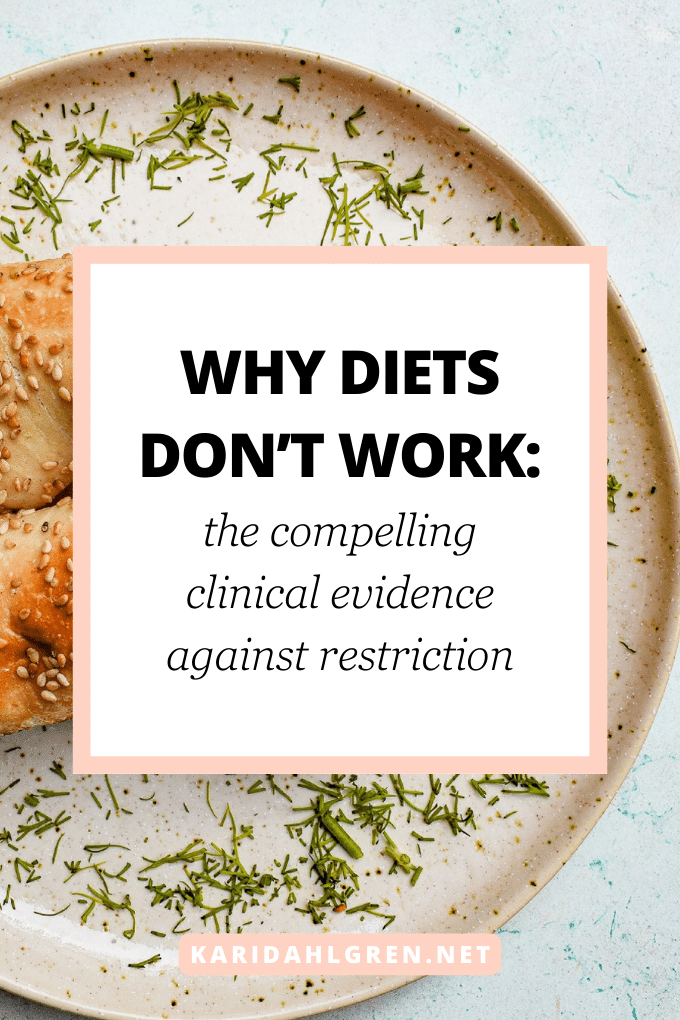
Dieting has become an ingrained part of our culture, with many of us trying diet after diet in an effort to lose weight. But have you ever wondered why diets don’t work in the long term? After a week of “eating well” or “eating clean,” why do we end up binge eating in front of the fridge on Friday night?
I have plenty of clinical evidence and personal experience to explain why this happens and what you can do to stop the cycle. For starters, the body is hard-wired to rebel against dieting in an effort to preserve energy and promote survival. When we fully understand the science behind this, it becomes clear that diets don’t work.
However, this doesn’t exactly help point us in the right direction. If diets don’t work, what does? Once we get through the science, I’ll dig into the reverse psychology of weight loss and provide clear steps you can take to heal your relationship with food without dieting ever again.
Why Diets Don’t Work: Looking at the Evidence First
The restrict-binge cycle is a familiar pattern for many dieters. It involves periods of strict dieting or food restriction followed by episodes of uncontrollable overeating or binge eating. Contrary to popular belief, this isn’t a sign of low willpower, but rather a result of complex biological and psychological triggers.
When we deprive ourselves of calories through dieting, our bodies try to ensure our survival by triggering hormones that increase our cravings for food.[1] One such hormone is ghrelin, often called the “hunger hormone.”
Studies have shown that when food intake is restricted, ghrelin production increases, causing intense cravings.[2] This explains why sticking to a diet can feel like an uphill battle: the more we restrict, the more we crave food.[3] Our bodies are wired to survive.
The impact of hormonal changes due to dietary restriction goes beyond mere hunger pangs.[1] Restriction also slows down your metabolism, leading to a greater tendency to retain energy (in the form of body fat) when you eventually do eat.[4] This means that if you indulge in a binge after a period of restriction, a slower metabolism means those extra calories can lead to weight gain.
In fact, plenty of clinical evidence shows that dieting makes someone more predisposed to weight gain, not weight loss.[5]
This is contrary to the linear “calories in, calories out” concept many diets rely on. According to this theory, weight loss is simply a matter of burning more calories than you consume.
However, this perspective dramatically oversimplifies the human body’s complex mechanisms and responses to food deprivation, where dietary restriction causes a cascade of biological mechanisms that increase cravings, increase the desire for food, and perpetuate the restrict-binge cycle.
The Reverse Psychology of Weight Loss: Deprivation Leads to Obsession with Food
Furthermore, it’s important to consider the psychological toll of the restrict-binge cycle. Constant self-deprivation can lead to feelings of guilt, shame, and failure when we inevitably “give in” to cravings. This emotional distress can create a vicious cycle where we turn to food for comfort, further reinforcing the cycle of restriction and binging.
Perhaps one of the most striking illustrations of the restrict-binge cycle is the Minnesota Starvation Experiment.[6] Conducted during World War II, the experiment involved 36 healthy men put on a semi-starvation diet, consuming only about half of the calories they needed for six months.
This led not only to physical changes, such as weight loss and a slower metabolism, but also to psychological effects: the men became obsessed with food. After this semi-starvation phase, when they were allowed to eat freely, they went on uncontrollable eating sprees.
The findings of this experiment underline the dangers of severe calorie restriction – it messes with both our bodies and our minds. It shows that when we restrict our food intake, it’s not just our hunger that increases; we also develop an obsession with food, leading to overeating or binging when we finally have access to it.
Diet’s Don’t Work Because You’re Practicing the Wrong Skill
Now that we’ve laid a clear foundation of clinical evidence behind why diets don’t work, I’d like to bring my personal experience and Psycho-Spiritual Wellness philosophy into the mix.
Psycho-Spiritual Wellness is my approach to stopping compulsive eating rooted in psychological and spiritual practices. I’ve found that almost everyone already knows what healthy food and exercise entails — yet we self-sabotage and overeat anyway. This is why I’ve sought a method to stop compulsive eating that shifts the focus away from food and exercise and hones in on the psychological and even spiritual factors behind our relationship with food.
Here’s my YouTube video that explains exactly why diets don’t work from my psycho-spiritual perspective:
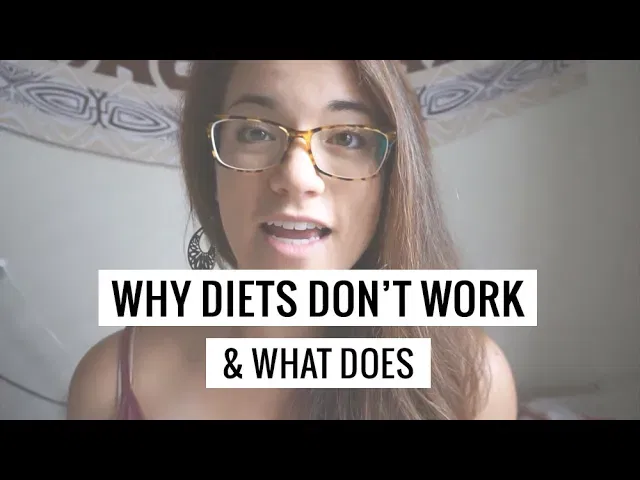
In short, diets don’t work because you’re practicing the wrong skill. The brain is designed to be efficient and adapts itself to make frequently-practiced tasks easier to execute. Just like learning how to walk, practice is how skills are formed.
When we continuously try diet after diet, the brain adapts to become efficient at the skill of restriction. This is why, after many months of Weight Watchers, for example, your brain rattles off exactly how many points every food is worth whether you want to run through this useless math or not. As we just demonstrated, dieting and restriction isn’t a very effective skill to have.
Furthermore, dieting counterproductively depletes our willpower. Many studies have shown that willpower is a finite resource, which means we can’t white-knuckle a restrictive diet even if we really want to.[7] On that note, it’s worth mentioning that contrasting research challenges the ‘willpower as a finite resource’ perspective.[8] In fact, certain studies even suggest that it might just be a placebo effect, where the belief in willpower’s finite nature makes it so.[9] Nevertheless, when considering the constraints of a single day, a substantial body of clinical evidence supports the notion that willpower is, in practice, a finite and depletable resource.[7], [10], [11], [12]
What does this mean for the effectiveness, or rather ineffectiveness, of dieting? When we use our willpower to restrict the foods that we love, that restriction only burns out our willpower and perpetuates the restrict-binge cycle, eventually leaving us right back where we started — perhaps even more ‘in the hole’ and feeling depleted, demoralized, and defeated.
If you want to stop dieting and also stop overeating, you need to redirect your willpower to a better skill. Stop practicing restriction. Instead, practice the #1 skill of the Psycho-Spiritual Wellness path to stopping compulsive eating: emotional tolerance.
A Better Skill Than Dieting: Emotional Tolerance
Developing tolerance for discomfort is a pillar of Psycho-Spiritual Wellness. When you build more tolerance for discomfort, you stop seeking food to “take the edge off,” because your threshold for discomfort has increased.
To develop emotional tolerance, I recommend practicing the Stop, Drop, & Feel. This is my #1 tool to stop binge eating, and on most occasions, it can even stop a binge in its tracks because of how effectively it targets the root cause of emotional eating, which is emotion, not food.
Here’s a video that explains how it works:
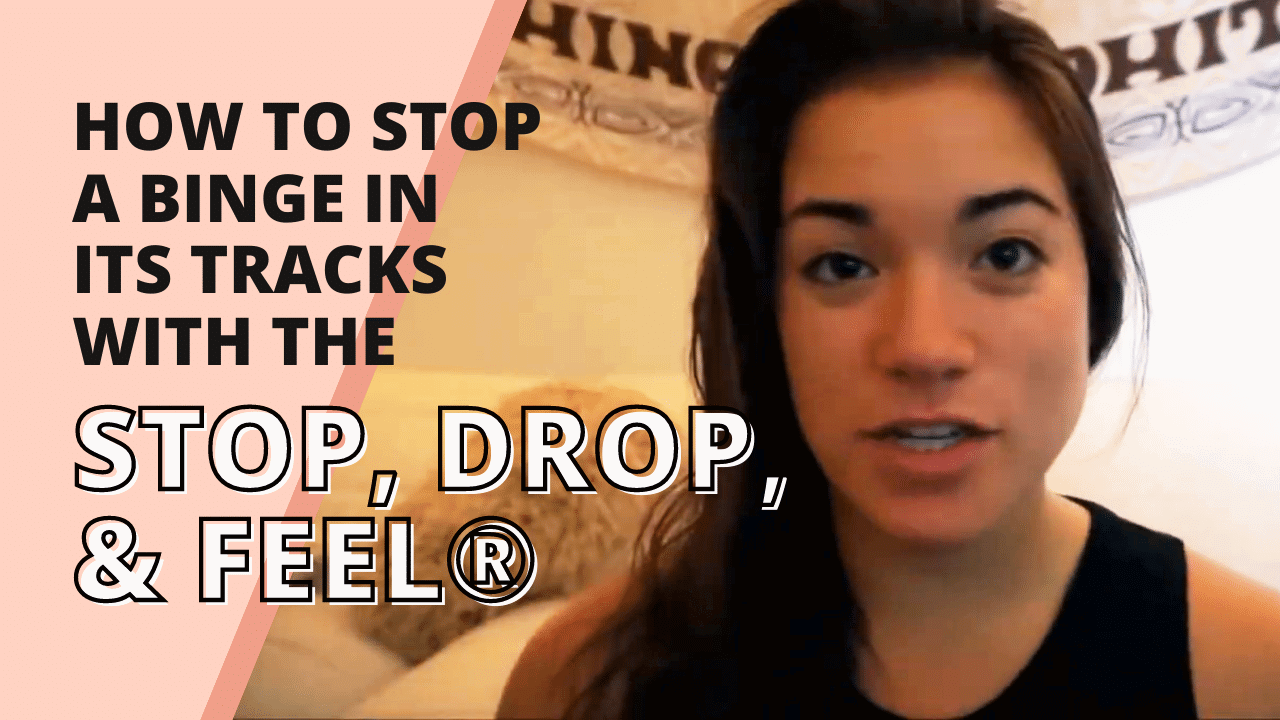
The Stop, Drop, & Feel always starts with permission, otherwise it just turns into another diet. Whenever you have the desire to eat when you aren’t hungry, promise yourself that you can still eat exactly what appeals to you when you’re done with the SDF. This keeps it from becoming a form of restriction.
Then, go into another room and drop into your body, and get curious about what you’re feeling without resisting anything. Whenever emotional eating is involved and we are eating for reasons other than hunger, there is always an uncomfortable feeling floating around. The Stop, Drop, & Feel helps you develop awareness and tolerance for whatever that feeling is.
For example, when I first started out with this tool, I found that I often craved candy when I wasn’t hungry in response to feeling bored or lonely. Most of the time, I wasn’t aware of these emotions – I just thought I was addicted to sugar. However, when I would pause to do the SDF, I would often feel overwhelmed with these emotions. Fortunately, when we give our emotions room and space to exist, they lose their edge, and it takes the compulsion out of compulsive eating.
While this tool can take you far and it remains the bread and butter of my approach to stopping compulsive eating, you can’t stop here. While the Stop, Drop, and Feel addresses the emotional aspect of overeating, we haven’t addressed the restriction aspect.
How to Reach Your Natural Weight Without Dieting
Another pillar of Psycho-Spiritual Wellness is to give up dieting and allow all foods. While this often triggers a fear of weight gain, it harnesses the power of reverse psychology and it stops triggering your body’s biological response to deprivation (binge eating).
It can feel scary and vulnerable to give up dieting because for many of us, giving up dieting is just like giving up control.
Since every diet triggers a biological cascade of events that cause you to crave even more food and perpetuates the restrict-binge cycle, it’s clear that something other than dieting needs to be used.
Here are some steps to help you through the process of giving up dieting and healing your relationship with food:
- Acknowledge that the fear of gaining weight is valid. Also acknowledge that if dieting results in binge eating, then giving up dieting should actually help with weight loss over the long-term.
- Follow the Psycho-Spiritual Wellness eating guidelines. They’re really simple: eat when you feel physically hungry, stop when you feel full, and feel your feelings when you want to eat when you’re not hungry. If this ever becomes difficult, move onto the next step:
- Start practicing the Stop, Drop, and Feel on a regular basis. This is how you can develop the emotional tolerance necessary to stop dieting and still reach your natural weight. Emotional tolerance is a productive skill to practice, unlike dieting.
- Give yourself permission to eat what your body wants. Restricting certain foods like carbs and sweets only increases our desire for them. Stop practicing restriction. Turn your attention towards emotional tolerance instead.
Nothing is going to make it easy or comfortable to give up dieting. In fact, the vulnerable feeling that might bubble up when you think about giving up dieting is the perfect emotion to practice the Stop, Drop, & Feel with. When you practice feeling vulnerable, you get better at feeling that way without getting swept away by it.
Healing Your Relationship with Food Without Dieting
I hope these steps, along with everything else I teach through Psycho-Spiritual Wellness, can help you create a solid foundation to rebuild your relationship with food. I hope that you get to start allowing yourself to eat foods that you actually enjoy, and use your tools – like the Stop, Drop, & Feel – whenever you feel like eating past fullness.
Remember that diets often fail, not because of a lack of willpower, but because of the body’s complex cascade of biological responses to restriction. Moving away from dieting may trigger the fear of gaining weight, but when practiced alongside emotional tolerance-building skills like the Stop, Drop, & Feel, it will address the root issue and put you in the driver’s seat.
To learn more about my unique approach to stopping compulsive eating, check out my free ebook below titled The Spiritual Seeker’s Guide to Stop Binge Eating:
- Sumithran, Priya et al. “Long-term persistence of hormonal adaptations to weight loss.” The New England journal of medicine vol. 365,17 (2011): 1597-604. doi:10.1056/NEJMoa1105816
- Tschöp, M et al. “Ghrelin induces adiposity in rodents.” Nature vol. 407,6806 (2000): 908-13. doi:10.1038/35038090
- Cameron, Jameason D et al. “Energy depletion by diet or aerobic exercise alone: impact of energy deficit modality on appetite parameters.” The American journal of clinical nutrition vol. 103,4 (2016): 1008-16. doi:10.3945/ajcn.115.115584
- Pourhassan, Maryam et al. “Impact of body composition during weight change on resting energy expenditure and homeostasis model assessment index in overweight nonsmoking adults.” The American journal of clinical nutrition vol. 99,4 (2014): 779-91. doi:10.3945/ajcn.113.071829
- Buchanan, Kiera et al. “Predictors of diet failure: A multifactorial cognitive and behavioural model.” Journal of health psychology vol. 24,7 (2019): 857-869. doi:10.1177/1359105316689605
- Dulloo, Abdul G. “Physiology of weight regain: Lessons from the classic Minnesota Starvation Experiment on human body composition regulation.” Obesity reviews : an official journal of the International Association for the Study of Obesity vol. 22 Suppl 2 (2021): e13189. doi:10.1111/obr.13189
- Baumeister, Roy F et al. “The Strength Model of Self-Regulation: Conclusions From the Second Decade of Willpower Research.” Perspectives on psychological science : a journal of the Association for Psychological Science vol. 13,2 (2018): 141-145. doi:10.1177/1745691617716946
- Xu, Xiaomeng et al. “Failure to replicate depletion of self-control.” PloS one vol. 9,10 e109950. 21 Oct. 2014, doi:10.1371/journal.pone.0109950
- Job, Veronika et al. “Ego depletion–is it all in your head? implicit theories about willpower affect self-regulation.” Psychological science vol. 21,11 (2010): 1686-93. doi:10.1177/0956797610384745
- Muraven, M, and R F Baumeister. “Self-regulation and depletion of limited resources: does self-control resemble a muscle?.” Psychological bulletin vol. 126,2 (2000): 247-59. doi:10.1037/0033-2909.126.2.247
- Inzlicht, Michael, and Jennifer N Gutsell. “Running on empty: neural signals for self-control failure.” Psychological science vol. 18,11 (2007): 933-7. doi:10.1111/j.1467-9280.2007.02004.x
- Gailliot, Matthew T et al. “Self-control relies on glucose as a limited energy source: willpower is more than a metaphor.” Journal of personality and social psychology vol. 92,2 (2007): 325-36. doi:10.1037/0022-3514.92.2.325

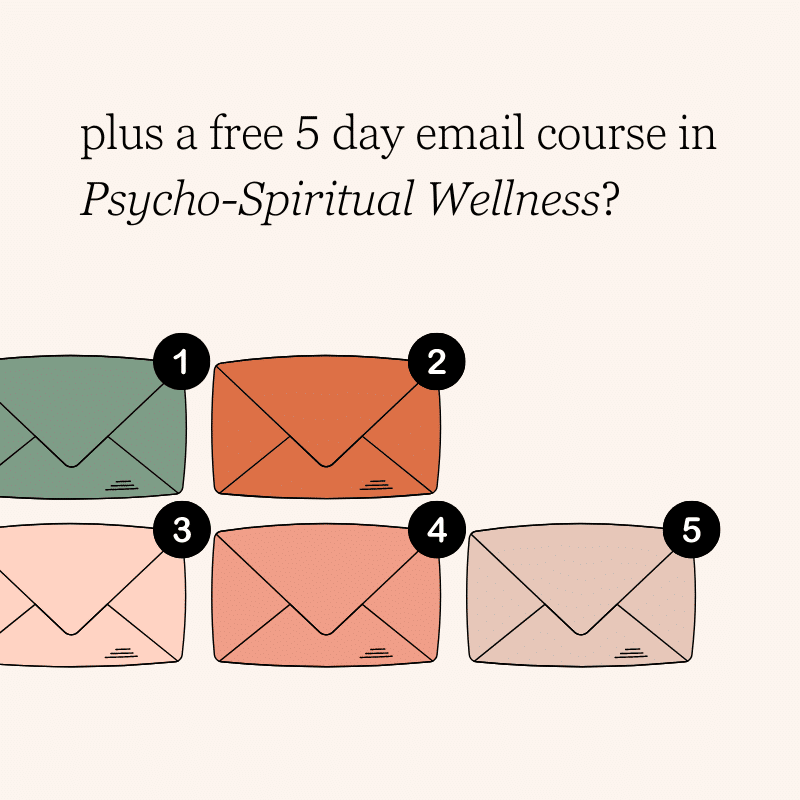
![best seller [cover of Why We Do the Things We Do]](https://karidahlgren-net.b-cdn.net/wp-content/uploads/2023/09/why-we-do-the-things-we-do-1.png)
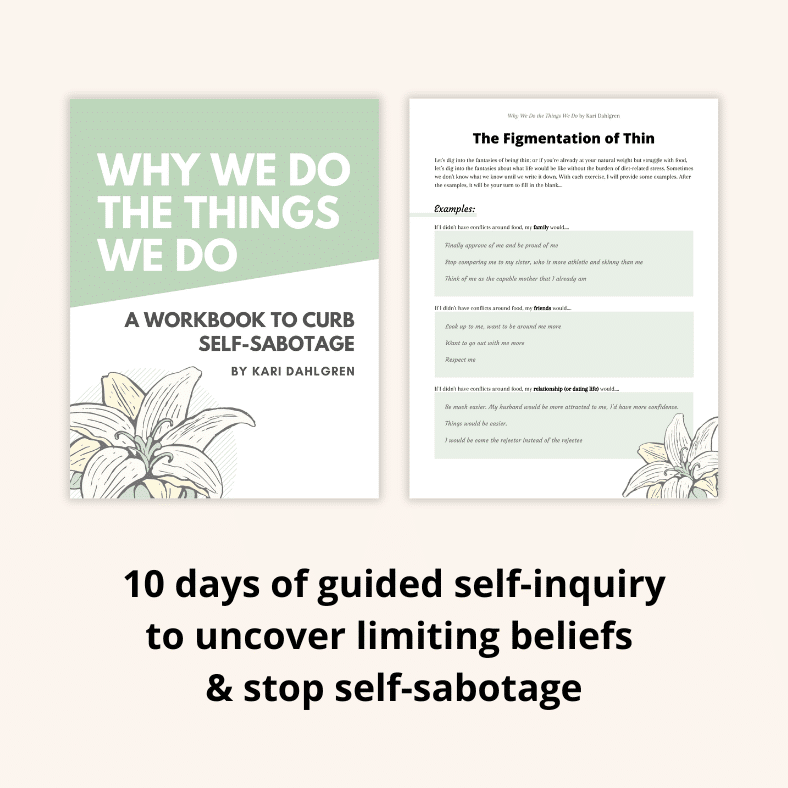
I am a sweet binge eater. Can not stop. Tried keto for a while it would then started to binge on sweet keto or not. Help
All the step are listed right in this article 🙂
I can really relate to the article, I have been dieting all my life, every week and ended up binge eating at the end of the week, then cycle of dieting will start again. I am really tired of this trauma, I want to be happy while losing weight. I as scared of eating carbs and wasted a lot of money on diets, shakes, pills you name them. I tried every diet every week even went on keto, banting, Herbalife, once I lose I get motivated but the binge eating does not stop.
I want to be normal, look happier and have a healthy relation around food, manage my portion size and enjoy my meals without being scared of putting on weight. I Also realized that with every diet I didn’t have energy for exercising.
I have recently decided to stop dieting, instead of binge eating every Friday, I decided to eat everything I want in moderate, plan my meals as normal and start living, jog every morning.
I hope this works for me, I’m yet to teach other people about the truth about dieting.
Congrats on taking the brave step of giving up dieting. It’s not easy, and you should be proud!